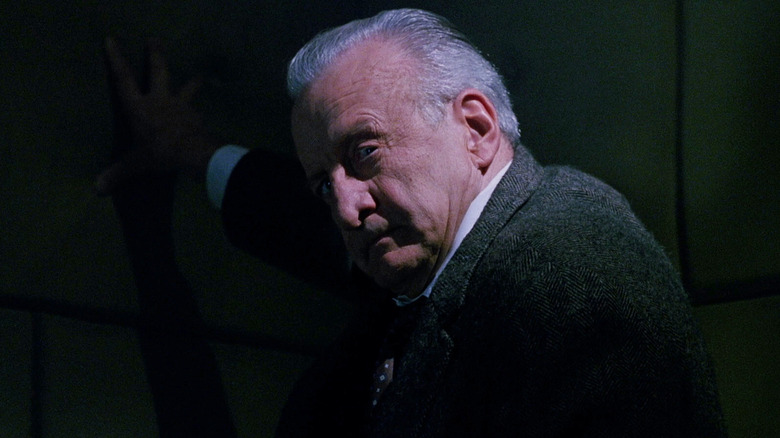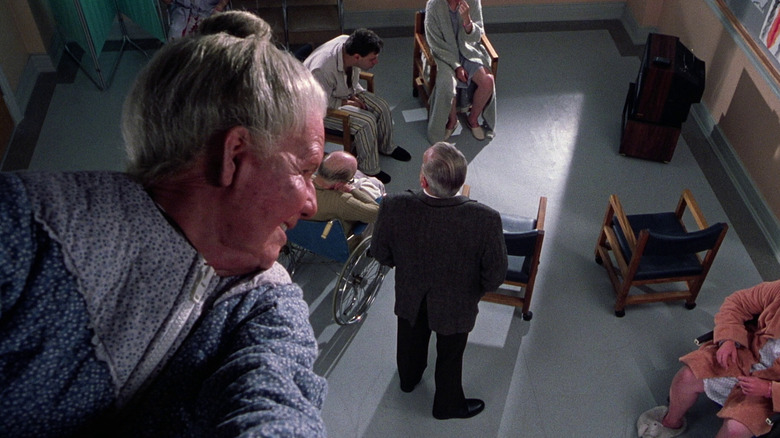The Exorcist III Director Begged The Studio To Change One Thing About The Horror Sequel
We may receive a commission on purchases made from links.
William Peter Blatty's 1990 horror film "The Exorcist III" was based on his own 1983 novel "Legion," a follow-up to his 1971 hit novel "The Exorcist." Although both books featured common characters (police detective Kinderman is the protagonist, and he talks to the presumed-dead Father Damian Karras), it's a different kind of story, staged more like a combined police procedural, bleak serial killer thriller (based very closely on the Zodiac murders), and supernatural mystery. Blatty wrote and directed the 1990 film adaptation, thinking that it, too, would only be tangentially related to "The Exorcist" and possess a similar genre-bending approach.
"The Exorcist III" wasn't a big hit in 1990, but it has undergone a substantial re-evaluation over the years, and some cineastes now consider it to be almost as good as William Friedkin's 1973 film adaptation of "The Exorcist." Kinderman is played in the film by George C. Scott (replacing Lee J. Cobb from Friedkin's movie), and the sequel does indeed succeed in being a police procedural combined with a supernatural mystery. It also features some very potent, unsettling images (including an infamous jump scare) and climaxes with a semi-surreal conversation that links spirituality, demons, and the divine. It's complex, heady, ambitious, and overall quite good.
Like his novel, Blatty hoped his 1990 film would also be called "Legion" and not have the world "Exorcist" in its title. Early teasers for the movie suggest that Blatty was initially able to reach a compromise with the film's studio backers, as they refer to the film as "The Exorcist III: Legion." Blatty, you see, wanted his movie to stand on its own, but he also wanted to distance himself from John Boorman's truly awful and disastrous 1977 sequel, "Exorcist II: The Heretic." Unfortunately, the executives behind the film ultimately insisted that the word "Exorcist" appear in the title and that an actual exorcism be included in the movie.
William Peter Blatty didn't want the world 'Exorcist' in the title
Blatty was convinced that "The Exorcist III" tanked at the box office simply because it was called "The Exorcist III." He felt he could've told an interesting story and attracted a huge audience without having to remind them of Boorman's critical and commercial flop. Blatty also didn't want there to be an actual exorcism in the movie or tell a story without exorcists. While the film was in production, 20th Century Fox and fellow production studio Morgan Creek were kicking around various titles, including "Exorcist: Legion" and "The Exorcist: 1990," but Blatty kept on insisting it was a bad idea.
Blatty's protest of this note was recorded in Bob McCabe's 2000 biography "The Exorcist: Out of the Shadows." As he put it:
"I begged them when they were considering titles not to name it 'Exorcist' anything — because 'Exorcist II' was a disaster beyond imagination. You can't call it 'Exorcist III,' because people will shun the box office. But they went and named it 'Exorcist III.' Then they called me after the third week, when we were beginning to fade at the box office, and they said, 'We'll tell you the reason: It's gonna hurt, you're not gonna like this — the reason is 'Exorcist II.” I couldn't believe it! They had total amnesia about my warnings!"
Morgan Creek also insisted that Blatty include an exorcism in the movie (an element that wasn't present in his original book). Blatty protested that as well but ended up having to film one anyway. In the end, Jason Miller was hired to return as Damian Karras for this unnecessary sequence, which added an extra $4 million to the movie's budget. Miller, however, wasn't capable of acting due to extreme alcoholism, so Brad Dourif played the character throughout the rest of the movie (with all of his scenes being shot after the fact).
Despite all the notes and studio-mandated changes, "The Exorcist III" turned out well, and horror fans the world over have come to love its ambition. Blatty's ideas came through in spite of everything else, and while his original vision for the film may have turned out better, the version we got wasn't bad.

